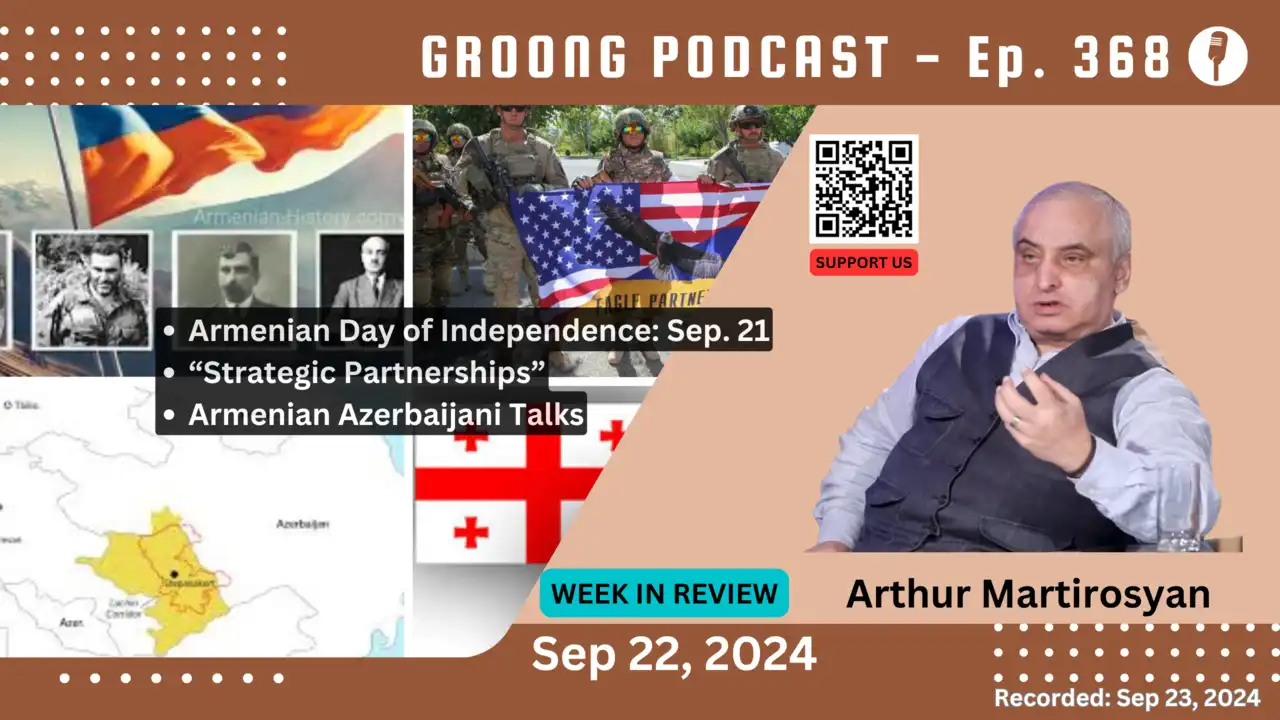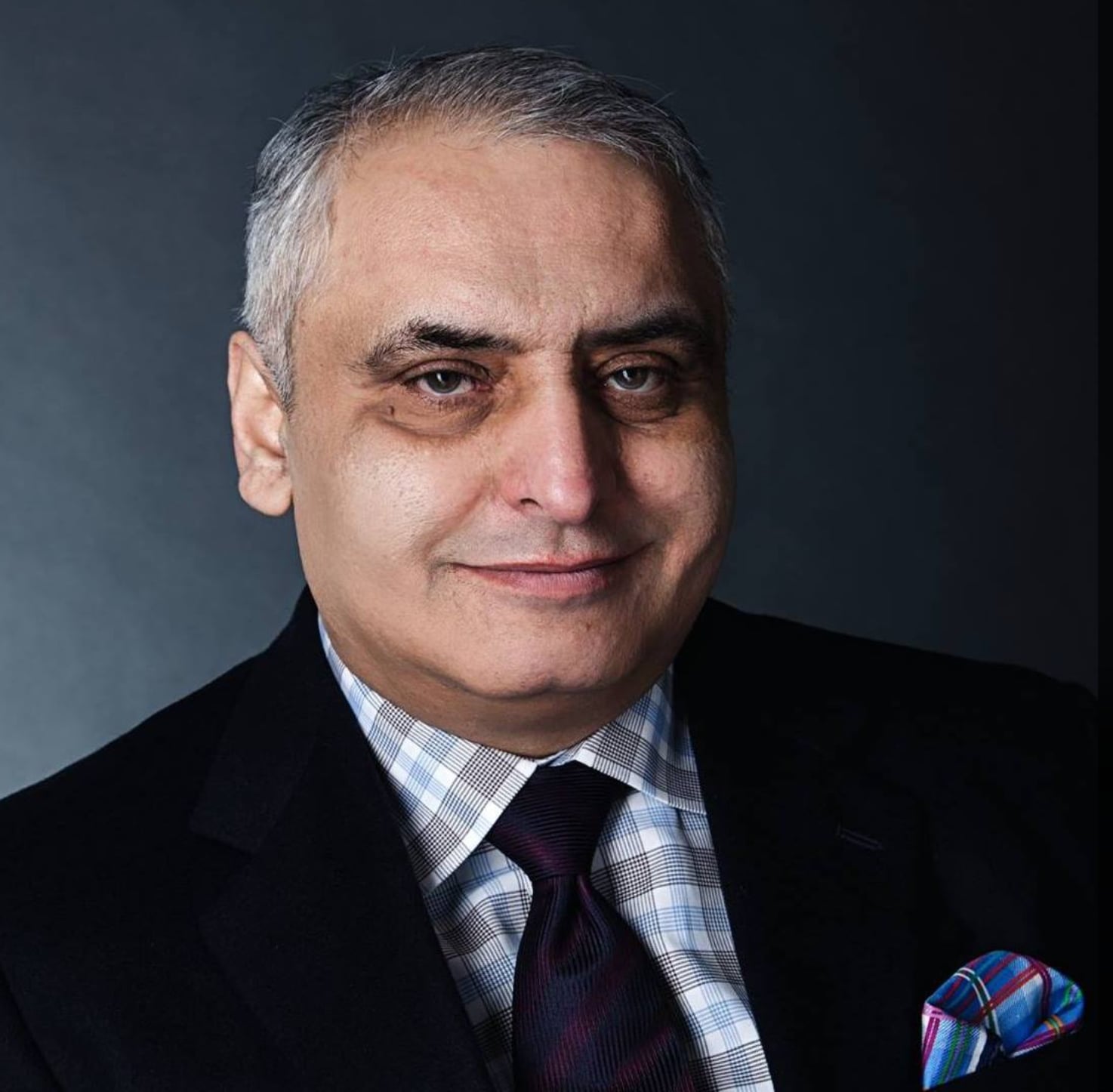
Groong Links:
Guest:
Topics:
- Armenian Day of Independence: Sep. 21
- “Strategic Partnerships”
- Armenian Azerbaijani Talks
Episode 368 | Recorded: September 23, 2024
Show Notes
Day of Independence of the Third Republic, Sep. 21
Last week, Saturday, September 21, was Armenia’s Independence Day. The country turned 33 years old.
Before the 2020 war, it used to be a reminder of the resilience and enduring spirit of the Armenian people, who, throughout centuries of hardship, have preserved their culture, language, and identity. Independence is not just a date on the calendar—it is the foundation of our nationhood, and it gives us a chance to reflect on the past, celebrate our achievements, and strengthen our hope for the future.
After 2020, and especially after the ethnic cleansing of Artsakh, we also must acknowledge the solemn reality that accompanies this moment. Just two days before our Independence Day, on September 19th, we marked the first anniversary of the tragic ethnic cleansing in Nagorno-Karabakh, or Artsakh.
In summary, last week was full of contradictory feelings for all of us.
Question:
- What are your thoughts on the meaning of this date? Why is it important?
Other things that happened last week:
- Pashinyan was at the so-called “Global Armenian Summit” featuring hand-picked participants from the diaspora who would accept an invitation to participate. During his speech, he underscored that Armenia’s national patriotism had “destructive” aspects in it. He further blamed external “empires” for instituting this destructive patriotism.
- Meanwhile, on the anniversary of Artsakh’s ethnic cleansing, Ihlam Aliyev was in Stepanakert, where he toured the depopulated town, opened a university and called Armenians settlers and visitors in the ancient land where they’ve lived for thousands of years.
Question:
- What can you tell us about the messaging that Pashinyan and Aliyev to their respective people?
“Strategic Partnerships”
US - Armenia
Over the course of 2024 the term “strategic partnership” has been perhaps overused. Armenia has a strategic partnership with Georgia, which nobody has any idea of what it means. And two days ago Biden’s congratulatory letter on the independence day of Armenia’s third republic also alluded to a strategic partnership between Armenia and the US.
Questions:
- What kind of “strategic partnership” can the US and Armenia have, what is the vision here?
- How will this vision or partnership affect Armenia’s membership in the CSTO, but also at this point the EAEU? Putin has essentially said that the two organizations are tied at the hip, you pretty much can’t be in one and not be in the other.
- What about the aspects of the US relationship with Azerbaijan? Are they more “strategic” than Armenia’s?
Georgia - Armenia
A week ago Pashinyan was in Tbilisi discussing the strategic partnership that the two countries signed earlier in this year. Back then the agreement explicitly excluded defense partnership, but defense minister Papikyan and his staff have also visited Georgia since then.
Questions:
- Very little is known about this agreement, what kind of “strategic partnership” is desired, and why is defense explicitly excluded?
- Who would be the main beneficiaries of this partnership?
Georgia’s elections next month have been painted by the West in very dire terms. They say that a vote for the ruling party Georgian Dream is a pivot towards Russia, and they want to see the opposition Unity Alliance, an umbrella including Saakashvili’s UNM, to win the elections.
Questions;
- What’s at stake in these elections for Georgia, is it really a pivot to the east or west for them?
- Is the US initiative to strengthen its position in Armenia a reaction to the difficulties the West is having with Georgia?
There’s been talk of Georgian Dream apologizing to the Abkhazians and the South Ossetians for the wrongs done to them by Georgia in Saakashvili’s days in 2008. But when we’ve asked our Georgian colleagues if such a Russia-Georgia rapprochement is in the cards, and if it could lead to the Abkhaz Railway reopening, we’ve heard that they think the talk of rapprochement is probably election hype and populism, or at the least premature.
Question:
- What’s your take on this Russia-Georgian rapprochement hints by Georgian Dream?
Armenian Azerbaijani Talks
In the past week two senior State Department officials, Joshua Huck and Louis Bono visited Yerevan and Baku with the aim to get closer to signing an agreement with Armenia. Azerbaijan reiterated that Armenia’s constitution must be changed, while Armenia repeated its proposal to sign a partial agreement. There’s talk of the two foreign ministers continuing work in the US this coming week during the UNGA meeting in New York.
Questions:
- What is the urgency on the part of the US, to get this agreement signed?
- What are the issues still on the table?
Thoughts from the Participants
- Hovik: Keep Armenian POWs at the top of the agenda, be active around #COP29
- Arthur: The Srbazan movement re-launching, popular pressure is the only thing keeping Pashiyan from full-speed concessions
Wrap-up
That’s our Week in Review, we hope you found it helpful. We invite your feedback and your suggestions, you can find us on most social media and podcast platforms.
Thanks to Laura Osborn for the music on our podcasts.
Guests

Arthur G. Martirosyan
Arthur G. Martirosyan is a Senior Consultant with CM Partners. In 1994, after graduating from Yale University, he joined Conflict Management Group and Harvard Negotiation Project, and has since worked on conflicts in the former Soviet Union, the Middle East, the Balkans, Africa, and Latin America.
Hosts

Hovik Manucharyan
Hovik Manucharyan is an information security engineer who moved from Seattle to Armenia in 2022. He co-founded the ANN/Groong podcast in 2020 and has been a contributor to Groong News since the late 1990s.
Disclaimer: The views expressed by Hovik Manucharyan on the ANN/Groong podcast are his own and do not necessarily reflect the opinions of his employer or any other organization.

Asbed Bedrossian
Asbed Bedrossian is an IT professional, and for years oversaw the central IT enterprise infrastructure and services at USC. His decades of experience spanned across IT strategy, enterprise architecture, infrastructure, cybersecurity, enterprise applications, data center operations, high performance computing, ITSM, ITPM, and more.
Asbed founded the Armenian News Network Groong circa 1989/1990, and co-founded the ANN/Groong podcast in 2020.